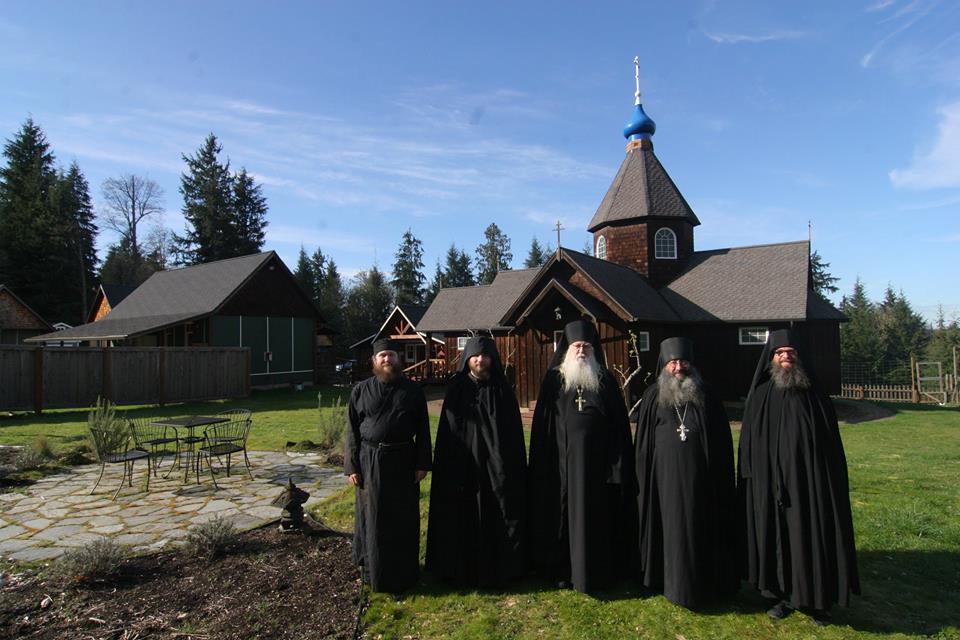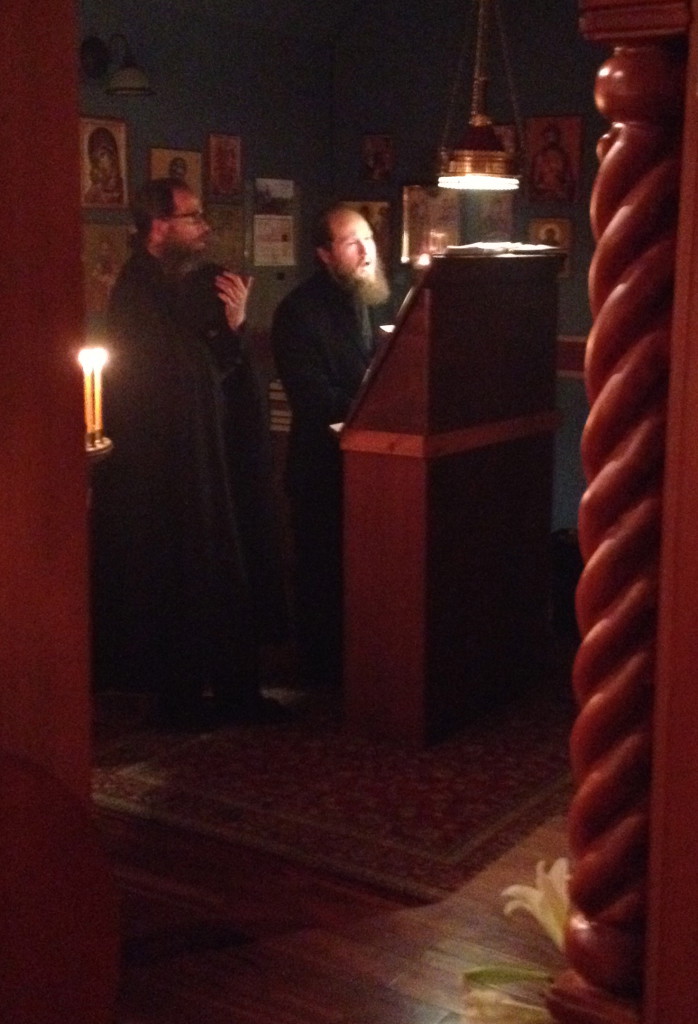Centers for spiritual healing, and transformation of life
Monastics are an integral part of the Church and should not be seen as independent of the Church Universal. Monks are bound by the same Gospel as other Christians and need to avail themselves to the missionary and pastoral needs of the Church, as needed. Although a primary role of monasticism is to be found in worship and contemplative prayer, monks also have a long history as missionaries.
Many of the great monasteries of Russia, as an example, were founded in remote places but became centers of pilgrimage, attracting countless people. Whole cities often formed around monasteries, precisely because the monks had reached out with the Gospel and worked among the people. Where there was a need, monks responded with charity and evangelical witness.
In these difficult times where people are suffering economic hardship, loss of jobs and foreclosure on homes, monks can bring a different perspective that can give hope to those who’ve lost all hope. Monasteries become centers of spiritual healing and empowerment. People who’ve been struggling to find meaning in their lives can walk away with a new vision, gained through the interior work of the monks who’ve availed themselves as therapists for those who are hurting.
The strength of Orthodox monasticism is not to be found in the sameness of every monastery, for each monastic community has its own expression, often quite different from other monasteries. In Greece and Russia, there are monastic communities that run printing presses, care for the elderly and infirm, run Orthodox bookstores in cities, live as hermits, run large retreat facilities, teach in schools, and even, on occasion, serve parishes.
Monasticism is not something that is mastered through academic pursuits, but is rather acquired over many years of struggle, through obedience, long nights of prayer, ascetical practice, and communal life. A monastic, who is true to his vocation, will often see himself as just a beginner, even though he’s been a monk for forty years, for he realizes how far he is from the perfection that comes with total surrender to Christ.
Many would wish to see monasticism in a romantic way, with monks quietly and silently living out hidden lives, yet there are monks who work with people as spiritual fathers, preachers, teachers, participating in an active way in service to the world. Each monk, and each monastery is called apart for the service of God and His Church, as God wishes. Thus, it is dangerous ground when we judge a monastery or a monk from our own fanciful image of what we think they should be like, for even on the Holy Mountain of Athos, there are many varieties of monastic expression, none being better than the other, and all based on the prompting of the Holy Spirit, as the monk attempts to live out the evangelical life of the Gospels.
Although the Orthodox Church does not have religious orders as the Latin Church does, there are in Orthodoxy different styles of monastic life, both individually and in community. Generally speaking some monasteries may be more liturgically oriented, while others may be more ascetic, while still others may have a certain mystical tradition, and others be more inclined to spiritual guidance and openness to the world for the purpose of care and counseling. These various styles of monasticism, which take both a personal as well as a corporate form, are not formally predetermined or officially legislated. They are the result of organic development under the living grace of God.
For every monastic, the most important element for his way of life are found in the words, “bless”, “may it be blessed”, and “forgive me”. Nothing is done without a blessing, so the monk asks for a blessing before doing anything, including his daily obedience’s. And the monk must live his life ready to forgiving everyone, and willing to ask everyone’s forgiveness.
All Orthodox monastics share the common vows of poverty, chastity, obedience, and stability of place, ever following the words of Jesus which are the cornerstone for this life, “be ye perfect as your heavenly Father is perfect.”
With love in Christ,
Abbot Tryphon
Sunday April 26, 2015 / April 13, 2015
Third Sunday of Pascha: The Myrrh-bearing Women. Tone two.
Sts. Myrrh-Bearing Women, righteous Joseph of Arimathea and Nicodemus (celebration on the 3rd Sunday of Pascha).
Right-believing Tamara, Queen of Georgia (movable holiday on the Sunday of Myrrh-Bearing Women).
Sts. Mary and Martha, sisters of St. Lazarus (1st c.) (movable holiday on the Sunday of Myrrh-Bearing Women).
All Saints of Thessalonica (celebration on the 3rd Sunday of Pascha) (Greek).
New Hieromartyr Seraphim, archbishop of Phanarion and Neochorion (celebration on the 3rd Sunday of Pascha) (Greek).
New Monk-martyr Elias (Ardunis) of Mt. Athos and Kalamata (1688) (celebration on the 3rd Sunday of Pascha) (Greek).
New Martyr Demetrius of Peloponnesus (1803) (celebration on the 3rd Sunday of Pascha) (Greek).
Hieromartyr Artemon, presbyter of Laodicea in Syria (303).
New Hieromartyr Stephen (Bekh) bishop of Izhevsk (1933).
Virgin-martyr Martha (1941).
Martyr Crescens of Myra in Lycia.
Martyr Thomais of Alexandria (476).
Martyr Demetrius of the Peloponnesus who suffered at Tripoli (1803).
Martyr Eleutherius of Persia (4th c.).
Martyr Zoilus of Rome (4th c.).
Venerable Martins, abbot, of Clermont (Gaul).
St. Martin the Confessor, pope of Rome (655) (Greek).
Martyrs Maximus (286), Dada and Quinctilian at Dorostolum in Moesia.
St. Martyrius, archbishop of Jerusalem (486).
St. Guinoch of Buchan.
Martyr Theodosius (Greek).
Scripture Readings
Acts 6:1-7
Seven Chosen to Serve
6 Now in those days, when the number of the disciples was multiplying, there arose a complaint against the Hebrews by the Hellenists,[a] because their widows were neglected in the daily distribution. 2 Then the twelve summoned the multitude of the disciples and said, “It is not desirable that we should leave the word of God and serve tables. 3 Therefore, brethren, seek out from among you seven men of good reputation, full of the Holy Spirit and wisdom, whom we may appoint over this business; 4 but we will give ourselves continually to prayer and to the ministry of the word.”
5 And the saying pleased the whole multitude. And they chose Stephen, a man full of faith and the Holy Spirit, and Philip, Prochorus, Nicanor, Timon, Parmenas, and Nicolas, a proselyte from Antioch, 6 whom they set before the apostles; and when they had prayed, they laid hands on them.
7 Then the word of God spread, and the number of the disciples multiplied greatly in Jerusalem, and a great many of the priests were obedient to the faith.
Mark 15:43-16:8
43 Joseph of Arimathea, a prominent council member, who was himself waiting for the kingdom of God, coming and taking courage, went in to Pilate and asked for the body of Jesus. 44 Pilate marveled that He was already dead; and summoning the centurion, he asked him if He had been dead for some time. 45 So when he found out from the centurion, he granted the body to Joseph. 46 Then he bought fine linen, took Him down, and wrapped Him in the linen. And he laid Him in a tomb which had been hewn out of the rock, and rolled a stone against the door of the tomb. 47 And Mary Magdalene and Mary the mother of Joses observed where He was laid.
He Is Risen
16 Now when the Sabbath was past, Mary Magdalene, Mary the mother of James, and Salome bought spices, that they might come and anoint Him. 2 Very early in the morning, on the first day of the week, they came to the tomb when the sun had risen. 3 And they said among themselves, “Who will roll away the stone from the door of the tomb for us?” 4 But when they looked up, they saw that the stone had been rolled away—for it was very large. 5 And entering the tomb, they saw a young man clothed in a long white robe sitting on the right side; and they were alarmed.
6 But he said to them, “Do not be alarmed. You seek Jesus of Nazareth, who was crucified. He is risen! He is not here. See the place where they laid Him. 7 But go, tell His disciples—and Peter—that He is going before you into Galilee; there you will see Him, as He said to you.”
8 So they went out quickly and fled from the tomb, for they trembled and were amazed. And they said nothing to anyone, for they were afraid.



Thank you for being faithful to God’s call on your lives and thus being a blessing to so many who visit the Monastery and read your posts, Abbot Tryphon. You are in my prayers.